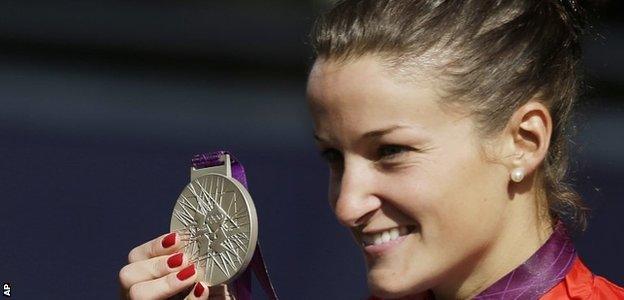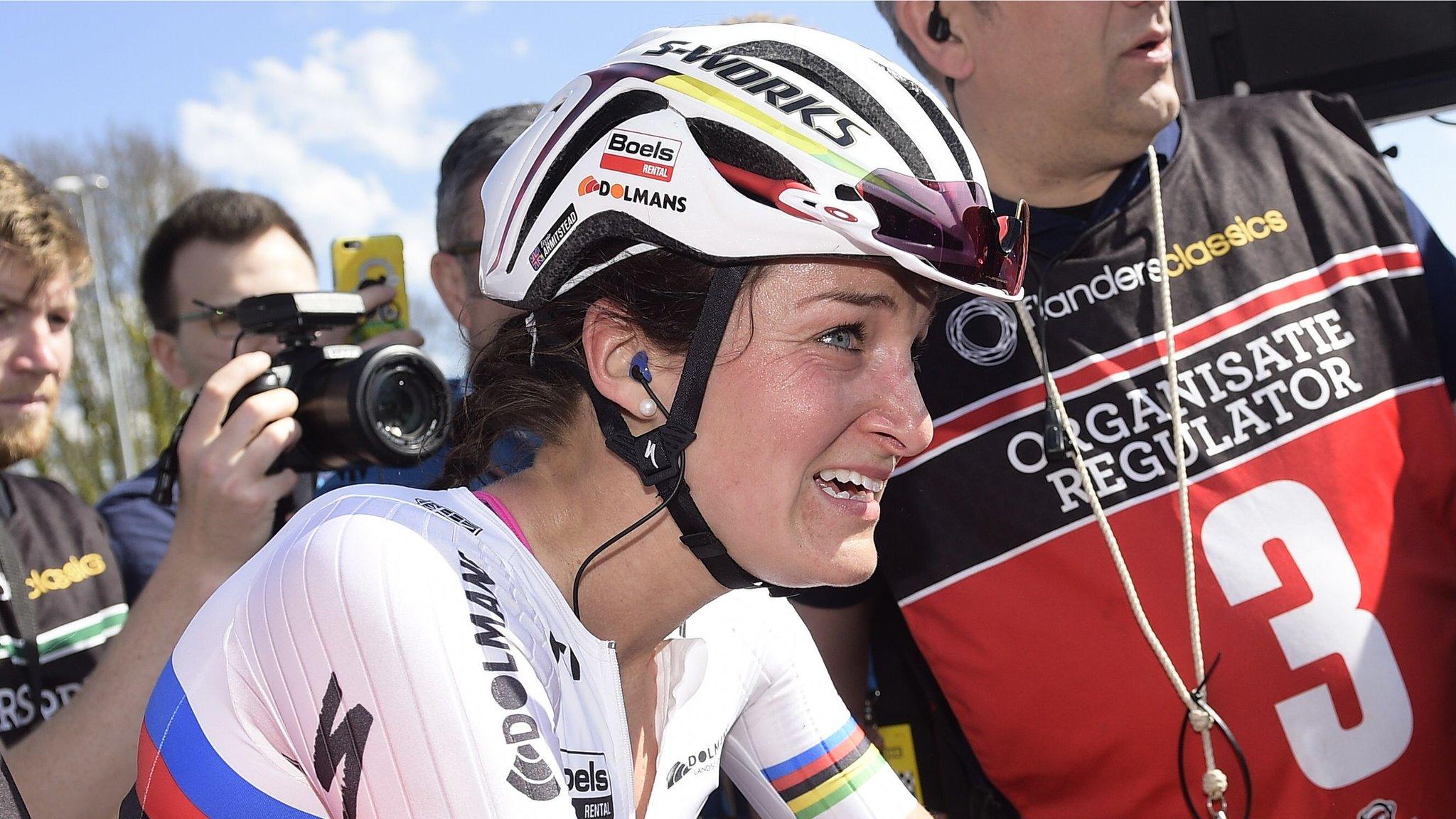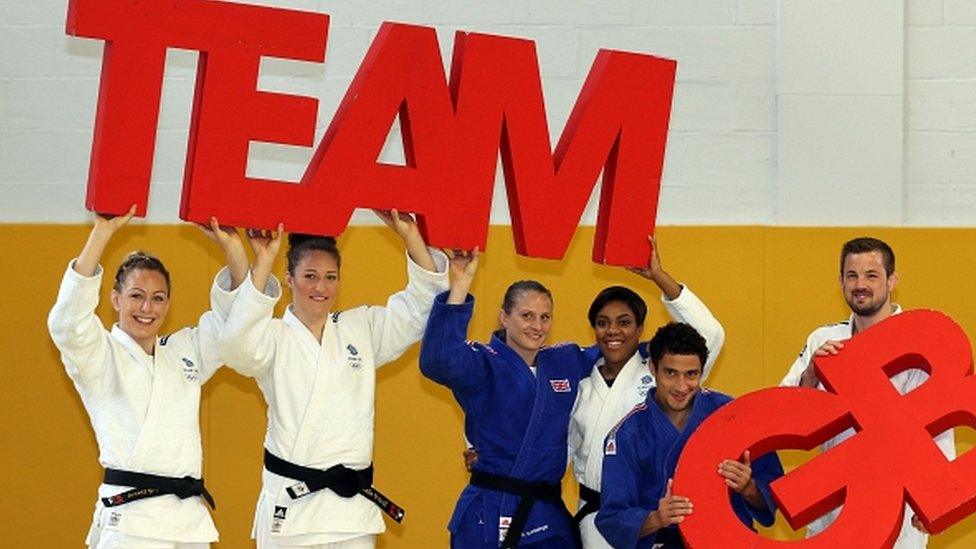Rio 2016 Olympics: Lizzie Armitstead defends missed drugs tests
- Published
Lizzie Armitstead says she will hold her "head high in Rio" and "hates dopers" following criticism for missing three drug tests.
The British world road cycling champion was suspended pending disciplinary action for missing the tests, putting her Olympic place in jeopardy.
But at a Court of Arbitration for Sport (Cas) appeal, she successfully argued the first test should be declared void.
"It hurts me to consider anybody questioning my performances," she said.
The 27-year old has issued a two-page statement explaining the circumstances for each missed test, setting out why she felt vindicated by the first test being declared void by Cas, and asking for understanding - not criticism.
"Integrity is something I strive for in every part of my life," she added. "I will hold my head high in Rio and do my best for Great Britain.
"I am sorry for causing anyone to lose faith in sport. I am an example of what hard work and dedication can achieve. I hate dopers and what they have done to the sport."
Athletes must make themselves available for testing for one hour each day and inform testers of their location.
Had Armitstead been found to have missed three tests in less than a year, she would have violated the World Anti-Doping Agency's code and faced a ban of up to two years.
Armitstead was charged by Ukad on 11 July with three so-called 'whereabouts' failures, leading to a suspension pending disciplinary action.
The first came at a World Cup event in Sweden on 20 August, 2015.
The second was an administrative failure by her on 5 October.
And the third was a missed test on 9 June this year following "an emergency family situation".
The contested test
UK Anti-Doping (Ukad) says Armitstead did not challenge the validity of the first two missed tests at the time.
Armitstead says she did contest the first strike, in Sweden, with a written explanation - but it was not accepted and she flew to the United States the following day for a competition.
"I had no legal advice or external support at the time," she said.
Armitstead said Cas supported her case because she was at the hotel she had stated she would be at and the testing official "didn't do what was reasonable and necessary to find me".
The Yorkshire cyclist added she had her mobile phone on silent at the time so as not to disturb a room-mate but said she was "available and willing to provide a sample".
She also pointed out she gave a negative test the following day at the UCI Women Road World Cup.
In a statement, Ukad chief executive Nicole Sapstead said it respected the outcome of the Cas hearing but had not yet been given the "reasoned decision" why the first test failure was not upheld.
Speaking to BBC Radio 5 live, Sapstead added: "I'd like to think that we are a reasonable organisation and we don't bring cases against athletes unless we see reason for doing so."

Lizzie Armitstead won Team GB's first medal. a silver, at the London 2012 Olympics
The other two tests
Armistead says her second strike of October 2015 was a "filing failure" rather than a missed test, relating to an inconsistency on a form over her whereabouts.
"This was an honest mistake," she said
She then met with British Cycling to put in an action plan and avoid any potential third strike.
This led to British Cycling official, Simon Thornton, being assigned to help her. However "this system fell apart" when he left the organisation - Armitstead says she was not told he had gone - and received a third strike on 9 June.
She adds she filed to change her one-hour time slot location on a form, but stressed: "My personal family circumstances at the time of the test were incredibly difficult.
"It was a traumatic time and I forgot to change a box on a form. I am not a robot I am a member of a family. Our suffering does not need to be part of a public trial."
Armistead says despite a psychiatric assessment of her state of mind at the time suggesting otherwise, Ukad did not believe her circumstances were "extreme enough" to avoid a charge.
Reaction
Britain's Nicole Cooke, Olympic road race champion in 2008, had earlier suggested she had little sympathy for anyone who missed three tests.
Writing on her website, Cooke, who had a public spat with team-mate Armitstead in the lead-up to 2012 Games in London, said: "Fair rules to be applied fairly, at all times, to all athletes."
Armistead's reprieve also caused some concern amongst other Olympians.
British rower Zac Purchase, who won Olympic gold in 2008, said British Cycling and the Armistead camp were guilty of a "monumental cock-up".
He added on social media: "Imagine what we would be saying if she was Russian... #NotWorthIt #KeepSportClean."
However, following Armitstead's statement, he added: "Good statement. The whereabouts system is tough. All athletes need support from governing bodies to stay the right side of the forms."
'The rules are there'
Britain's first three-time Tour de France winner Chris Froome: "I think the rules are there and the authorities are the ones with the information to make these decisions. You have to hope they make the right decision."
Double Olympic gold medallist Geraint Thomas: "With such a hectic race schedule you do make mistakes, but I was surprised when I saw the news. I fully think that Lizzie is a clean athlete, I've got no doubts about that."
- Published2 August 2016

- Published18 June 2015
- Published18 August 2016

- Published19 July 2016

- Published19 July 2016

- Published13 May 2016
